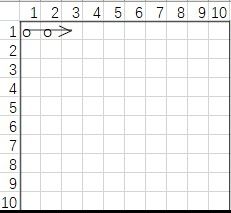贪吃蛇
疫情期间学习算法新生赛 - K 贪吃蛇
Problem:K
Time Limit:1000ms
Memory Limit:165535K
Description
Void_Monitor喜欢玩贪吃蛇,但是他很菜,现在他请你来帮忙。 给你一个a*a的正方形地图,第i行第j列的坐标为[I,j],贪吃蛇的初始长度为2,蛇头和蛇尾分别在坐标[1,2]、[1,1]处,初始运动方向为向右,初始时间为第0秒,贪吃蛇每秒会向运动方向移动一格。
现在有2种操作:
1 x y:表示Void_Monitor在第x秒按下了y键,y为LURD中的一种,分别表示Void_Monitor按下了左、上、右、下四种按钮。注意,如果按键方向和蛇头方向相同或相反时,蛇的运动方向不变,否则蛇的运动方向会从第x秒开始转向按键方向。
2 x:蛇在第x秒时吃到了果实,蛇的长度+1 需要说明的是:当蛇在第x秒转向时,蛇会先转向再进行运动;当蛇在第x秒吃到了果实时,蛇会先运动再在尾部运动轨迹方向上增加长度。另外,如果在贪吃蛇在一次运动后蛇头碰到蛇身,或者蛇上任意一点的坐标不在地图范围内,则视为贪吃蛇死亡,贪吃蛇将一直保持死亡前的位置。
请你输出第m秒过后贪吃蛇的位置。

图中为a=10时的地图以及初始状态蛇的位置和运动方向。
Input
第一行一个整数a。第二行两个整数n和m。接下来是n行,每行第一个数为 opt,表示操作编号。接下来的输入的变量与操作编号对应。题目保证操作按时间顺序给出,且每1秒最多只有1个操作,数据范围(2<=a<=100;1<=x,m,n<=10000,1<=opt<=2)。
Output
10行,每行10列,即第m秒过后的地图,蛇所在的位置输出’o’,其余位置输出’.’,以换行结尾
Sample Input
样例输入1:
10
10 20
2 1
2 2
2 3
2 4
2 5
1 6 R
1 7 D
1 8 L
1 9 U
2 10
样例输入2:
10
12 20
2 1
2 2
2 3
2 4
2 5
2 6
1 7 D
1 9 L
1 11 U
1 13 R
1 15 D
1 17 L
Sample Output
样例输出1:
...ooooo..
......oo..
..........
..........
..........
..........
..........
..........
..........
..........
样例输出2:
......oo..
.......o..
...ooooo..
..........
..........
..........
..........
..........
..........
..........
Hint
对于样例1,贪吃蛇在第9秒过后就死亡了,因此最后贪吃蛇保持的是死亡前(第8秒过后)的位置
Tips
一道巨麻烦的毒瘤模拟题。
注意:数据还存在 m
Code
#include